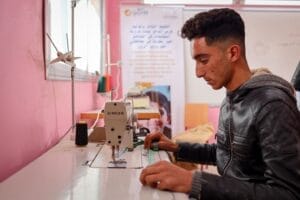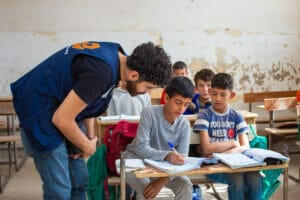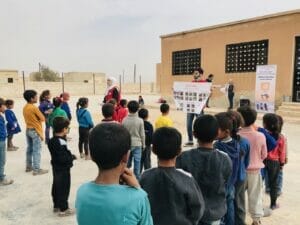
In the complex context of the Syrian crisis, children are the category most exposed to risks and to the denial for their rights. Among them, children with disabilities represent one of the most vulnerable groups. Even though there is no data on their exact number, as there are about 3 million people with disabilities in the country, it is intuitive that the number of minors with disabilities is not negligible. Their risk of exclusion from social life, at the core of which is school participation, - is unfortunately very high. Issues concerning access to education in Syria are wider for children with disabilities, especially in underserved rural areas. For this reason, within WeWorld’s actions supported by the Italian Cooperation, the promotion of inclusive education is understood as a fundamental strategy to guarantee access to quality education services for the most vulnerable groups of the population.
In this regard, the first challenge is given by the lack of accessible school facilities (including the sanitary facilities), that prevent physical access to children with mobility impairments. Secondly, it is crucial to support teachers in acquiring the necessary skills, tools and spaces to provide an adequate support for children with special educational needs. Lastly, it is fundamental to take action in order to reduce the strong social stigma on disabilities, which represents one of the main barriers to the participation on equal terms of children with disabilities in the social life in general, and in school life in particular.

Thanks to the support of the Italian Cooperation, WeWorld has been working together with local institutions and communities in urban centres and rural areas of Aleppo and Deir-ez-Zor, in order to reduce the main barriers of access to education for children with disabilities. The undertaken activities mirror an approach to inclusive education that has been discussed with the Ministry of Education and the Directorates of Education in Aleppo and Deir-ez-Zor and other key actors in the territory. Within these governorates, there are very few school facilities that meet the inclusiveness standards set by local authorities and those that can be defined as such, effectively lack the necessary resources to be operational. WeWorld has been operating in 8 schools, which have been rehabilitated and where the necessary school and sanitary materials have been provided to make the facilities inclusive. Moreover, in 7 schools we have created spaces for the development of early childhood, within dedicated classrooms, to carry out specific activities to support the learning process of children with special educational needs, benefiting more than 4,000 students. Moreover, 200 teachers have benefited from a training process on inclusive education.
However, besides infrastructural barriers and the scarcity of materials and personnel in schools, there are further protection risks. The lack of an inclusive culture at school and community level, based on the respect and on the understanding of diversity as a social resource, makes way for discrimination and exclusion. For this reason, WeWorld takes action not only on learning spaces and on teachers’ capabilities, but it also aims at increasing the knowledge and the awareness among the educating communities in general, through awareness campaigns that involve students, parents and communities as a whole. Over the past two years, this initiative has reached over 400 people.
Promoting the culture of inclusion contributes to ensure both the sustainability over time of the work undertaken and that children with disabilities in Syria have access to the same rights as their peers.



